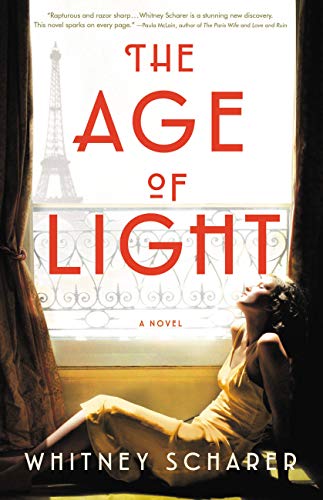Here’s a quick look at some notable books—new titles from the likes of Marlon James, Yiyun Li, Esmé Weijun Wang, Elizabeth McCracken, Roberto Bolaño, and more—that are publishing this week.
Want to learn more about upcoming titles? Then go read our most recent book preview. Want to help The Millions keep churning out great books coverage? Then sign up to be a member today.
Black Leopard, Red Wolf by Marlon James
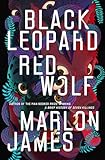 Here’s what Publishers Weekly had to say about Black Leopard, Red Wolf: “Booker winner James (A Brief History of Seven Killings) kicks off a planned trilogy with a trek across a fantastical Africa that is equal parts stimulating and enervating. Centering on the search for a lost boy, the plot is relatively straightforward, though the narrator, Tracker, moves his story obliquely ‘as crabs do, from one side to the next.’ Tracker is a ‘hunter of lost folk,’ an ornery loner with an extraordinary nose that lets him pick up the scent of his quarry from miles away. Along with several other mercenary hunters, he is hired by a slave trader to find a kidnapped boy, though who the boy is and why he is so valuable are mysteries to Tracker. Storytelling is a kind of currency in this world, as people measure themselves not only by their violent feats but also by their skill in recounting them, and they have plenty of material: giants, necromancers, witches, shape-shifters, warring tribes, and unspeakable atrocities. Indeed, there is a narrative glut, which barely lets readers acclimate to a new, wondrous civilization or grotesque creation before another is introduced. It’s altogether overwhelming, but on the periphery of the novel are intriguing ideas about the performance of masculinity, cultural relativism, kinship and the slipperiness of truth. Though marred by its lack of subtlety, this is nonetheless a work of prodigious imagination capable of entrancing readers.”
Here’s what Publishers Weekly had to say about Black Leopard, Red Wolf: “Booker winner James (A Brief History of Seven Killings) kicks off a planned trilogy with a trek across a fantastical Africa that is equal parts stimulating and enervating. Centering on the search for a lost boy, the plot is relatively straightforward, though the narrator, Tracker, moves his story obliquely ‘as crabs do, from one side to the next.’ Tracker is a ‘hunter of lost folk,’ an ornery loner with an extraordinary nose that lets him pick up the scent of his quarry from miles away. Along with several other mercenary hunters, he is hired by a slave trader to find a kidnapped boy, though who the boy is and why he is so valuable are mysteries to Tracker. Storytelling is a kind of currency in this world, as people measure themselves not only by their violent feats but also by their skill in recounting them, and they have plenty of material: giants, necromancers, witches, shape-shifters, warring tribes, and unspeakable atrocities. Indeed, there is a narrative glut, which barely lets readers acclimate to a new, wondrous civilization or grotesque creation before another is introduced. It’s altogether overwhelming, but on the periphery of the novel are intriguing ideas about the performance of masculinity, cultural relativism, kinship and the slipperiness of truth. Though marred by its lack of subtlety, this is nonetheless a work of prodigious imagination capable of entrancing readers.”
Where Reasons End by Yiyun Li
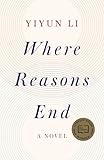 Here’s what Publishers Weekly had to say about Where Reasons End: “This heart-wrenching experimental novel from Li (The Vagrants) is framed as a dialogue between a writer and Nikolai, the teenage son she lost to suicide. The novel’s title comes from a poem by Elizabeth Bishop, and poetry is very much on the narrator’s mind, along with Alice in Wonderland and Wallace Stevens, as the freewheeling conversation turns toward such subjects as semantics, memory, the mechanics of grief, and a love that is ‘made not to last.’ Notably absent is a full reconstruction of her son’s suicide (this isn’t that kind of book), though readers do get to hear the voice of Nikolai—a precocious poet, painter, and oboist. During a conversation with her son, the mother wonders, ‘What if we accept suffering as we do our hair or eye colors?’ Like Joan Didion’s The Year of Magical Thinking or Peter Handke’s A Sorrow Beyond Dreams, Li’s novel tries to find a language to reckon with the unspeakable reality of death. The novel succeeds in Li’s approach of skirting the subject in favor of something between the dead’s nostalgia for life and regular small talk. This is a unique, poignant, and tender evocation of life as touched irrevocably by death.”
Here’s what Publishers Weekly had to say about Where Reasons End: “This heart-wrenching experimental novel from Li (The Vagrants) is framed as a dialogue between a writer and Nikolai, the teenage son she lost to suicide. The novel’s title comes from a poem by Elizabeth Bishop, and poetry is very much on the narrator’s mind, along with Alice in Wonderland and Wallace Stevens, as the freewheeling conversation turns toward such subjects as semantics, memory, the mechanics of grief, and a love that is ‘made not to last.’ Notably absent is a full reconstruction of her son’s suicide (this isn’t that kind of book), though readers do get to hear the voice of Nikolai—a precocious poet, painter, and oboist. During a conversation with her son, the mother wonders, ‘What if we accept suffering as we do our hair or eye colors?’ Like Joan Didion’s The Year of Magical Thinking or Peter Handke’s A Sorrow Beyond Dreams, Li’s novel tries to find a language to reckon with the unspeakable reality of death. The novel succeeds in Li’s approach of skirting the subject in favor of something between the dead’s nostalgia for life and regular small talk. This is a unique, poignant, and tender evocation of life as touched irrevocably by death.”
The Collected Schizophrenias by Esmé Weijun Wang
 Here’s what Publishers Weekly had to say about The Collected Schizophrenias: “In this penetrating and revelatory exploration, novelist Wang (The Border of Paradise) shows how having a bipolar-type schizoaffective disorder has permeated her life. Stating that ‘my brain has been one of my most valuable assets since childhood,’ she writes with blunt honesty about striving to be seen as ‘high functioning,’ aware that ‘the brilliant facade of a good face and a good outfit’ drastically affects how she is perceived. She explains her decision not to have children, while recalling time spent working at a camp for bipolar children, and muses about viewing her condition as a manifestation of ‘supernatural ability’ rather than a hindrance. Wang invariably describes her symptoms and experiences with remarkable candor and clarity, as when she narrates a soul-crushing stay in a Louisiana mental hospital and the alarming onset of a delusion in which ‘the thought settles over me, fine and gray as soot, that I am dead.’ She also tackles societal biases and misconceptions about mental health issues, criticizing involuntary commitment laws as cruel. Throughout these essays, Wang trains a dispassionate eye onto her personal narrative, creating a clinical remove that allows for the neurotypical reader’s greater comprehension of a thorny and oft-misunderstood topic.”
Here’s what Publishers Weekly had to say about The Collected Schizophrenias: “In this penetrating and revelatory exploration, novelist Wang (The Border of Paradise) shows how having a bipolar-type schizoaffective disorder has permeated her life. Stating that ‘my brain has been one of my most valuable assets since childhood,’ she writes with blunt honesty about striving to be seen as ‘high functioning,’ aware that ‘the brilliant facade of a good face and a good outfit’ drastically affects how she is perceived. She explains her decision not to have children, while recalling time spent working at a camp for bipolar children, and muses about viewing her condition as a manifestation of ‘supernatural ability’ rather than a hindrance. Wang invariably describes her symptoms and experiences with remarkable candor and clarity, as when she narrates a soul-crushing stay in a Louisiana mental hospital and the alarming onset of a delusion in which ‘the thought settles over me, fine and gray as soot, that I am dead.’ She also tackles societal biases and misconceptions about mental health issues, criticizing involuntary commitment laws as cruel. Throughout these essays, Wang trains a dispassionate eye onto her personal narrative, creating a clinical remove that allows for the neurotypical reader’s greater comprehension of a thorny and oft-misunderstood topic.”
Spirit of Science Fiction by Roberto Bolaño
 Here’s what Publishers Weekly had to say about Spirit of Science Fiction: “This striking, meandering novel from Bolaño (2666), written toward the beginning of his career, follows the coming-of-age of two young writers in Mexico City. Aspiring writers Jan and Remo get an apartment together. Jan spends his days holed up in the apartment, reading books and penning letters to sci-fi authors he admires, such as Ursula K. Le Guin and Fritz Leiber. Jan’s solitude is contrasted by Remo’s social jaunts around the city: he joins a poetry workshop, falls in love with a young woman named Laura, and rides a motorcycle. Remo’s involvement in the city’s literary scene exposes the reader to a number of digressive stories (one particularly memorable aside features Georges Perec unwittingly defusing a duel between poets Isidore Isou and André Vernier in Paris). Meanwhile, the reader also sees Jan’s searching letters, scattered throughout: ‘Oh, Ursula, it’s actually a relief to send out messages and have all the time in the world,’ he writes. Though more a collection of scenes and impressions and thinner than his other novels, this is an intriguing and dreamy portrait of two writers taking different paths in their pursuit of their love of literature, hoping to discover their voices.”
Here’s what Publishers Weekly had to say about Spirit of Science Fiction: “This striking, meandering novel from Bolaño (2666), written toward the beginning of his career, follows the coming-of-age of two young writers in Mexico City. Aspiring writers Jan and Remo get an apartment together. Jan spends his days holed up in the apartment, reading books and penning letters to sci-fi authors he admires, such as Ursula K. Le Guin and Fritz Leiber. Jan’s solitude is contrasted by Remo’s social jaunts around the city: he joins a poetry workshop, falls in love with a young woman named Laura, and rides a motorcycle. Remo’s involvement in the city’s literary scene exposes the reader to a number of digressive stories (one particularly memorable aside features Georges Perec unwittingly defusing a duel between poets Isidore Isou and André Vernier in Paris). Meanwhile, the reader also sees Jan’s searching letters, scattered throughout: ‘Oh, Ursula, it’s actually a relief to send out messages and have all the time in the world,’ he writes. Though more a collection of scenes and impressions and thinner than his other novels, this is an intriguing and dreamy portrait of two writers taking different paths in their pursuit of their love of literature, hoping to discover their voices.”
Bowlaway by Elizabeth McCracken
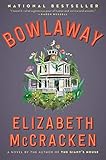 Here’s what Publishers Weekly had to say about Bowlaway: “McCracken’s stellar novel (after Thunderstruck) opens at the turn of the 20th century with Bertha Truitt being discovered unconscious in a cemetery in little Salford, Mass., seemingly having fallen from the sky. Bertha is middle-aged, plump, and enjoys the absence of a corset, but in spite of her unprepossessing appearance, she initiates a love affair with Leviticus Sprague, the doctor who revives her at the cemetery. The two marry and have a daughter, Minna. Townspeople, meanwhile, find Bertha charismatic; they begin to dream about her and to credit her with magical powers. With fierce determination, she establishes a bowling alley that uses newfangled candlepins, a game that she (falsely) claims to have invented. Bertha’s loving family completes her happiness before a freak accident (McCracken is a pro at inventing such surprises) derails her plans. Almost everyone—Joe Wear and Virgil, LuEtta and Jeptha, Nahum and Margaret—with whom Bertha has come in contact mystically finds himself or herself in love; often the catalyst is the bowling alley, where they meet. Loss is as prevalent as love, however, and the whims of fate cast a melancholy tinge on characters’ lives. The bowling alley itself is almost a character, reflecting the vicissitudes of history that determine prosperity or its opposite. McCracken writes with a natural lyricism that sports vivid imagery and delightful turns of phrase. Her distinct humor enlivens the many plot twists that propel the narrative, making for a novel readers will sink into and savor.”
Here’s what Publishers Weekly had to say about Bowlaway: “McCracken’s stellar novel (after Thunderstruck) opens at the turn of the 20th century with Bertha Truitt being discovered unconscious in a cemetery in little Salford, Mass., seemingly having fallen from the sky. Bertha is middle-aged, plump, and enjoys the absence of a corset, but in spite of her unprepossessing appearance, she initiates a love affair with Leviticus Sprague, the doctor who revives her at the cemetery. The two marry and have a daughter, Minna. Townspeople, meanwhile, find Bertha charismatic; they begin to dream about her and to credit her with magical powers. With fierce determination, she establishes a bowling alley that uses newfangled candlepins, a game that she (falsely) claims to have invented. Bertha’s loving family completes her happiness before a freak accident (McCracken is a pro at inventing such surprises) derails her plans. Almost everyone—Joe Wear and Virgil, LuEtta and Jeptha, Nahum and Margaret—with whom Bertha has come in contact mystically finds himself or herself in love; often the catalyst is the bowling alley, where they meet. Loss is as prevalent as love, however, and the whims of fate cast a melancholy tinge on characters’ lives. The bowling alley itself is almost a character, reflecting the vicissitudes of history that determine prosperity or its opposite. McCracken writes with a natural lyricism that sports vivid imagery and delightful turns of phrase. Her distinct humor enlivens the many plot twists that propel the narrative, making for a novel readers will sink into and savor.”
All My Goodbyes by Mariana Dimópulos
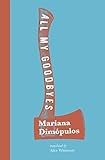 Here’s what Publishers Weekly had to say about All My Goodbyes: “Argentina’s Dimópulos debuts in English with this impressionistic account of a young woman’s ‘pilgrim years’ of itinerancy. The narrator leaves Buenos Aires at 23, proclaiming, ‘being useful is no use to me.’ For the next 10 years, she drifts through Spain and Germany, repeatedly falling in love but always finding a reason to keep moving. In Heidelberg, she charms a student with her knowledge of the Latin names of plants, and in Berlin, she rooms with a trauma therapist before abandoning her, broken-hearted, to run off with a globe-trotting businessman whom she’d first met roaming the beach in Málaga. Once back in Argentina, the narrator moves to a farm in the shadow of the Andes and begins a passionate affair with Marco, its proprietor. With him she begins ‘predicting a life for myself; for real this time, this time forever.’ That is, until he is brutally murdered. As more scandalous details surrounding Marco’s death emerge, however, the appeal of avoiding commitment, no matter how immature, becomes harder to ignore. ‘We know from our hydrogen and our oxygen that we are water as well as dust,’ Dimópulos writes. ‘And water runs.’ Dimópulos boldly abandons chronology in this novel, offering instead brief, interweaving glimpses of her narrator’s relationships to create a fascinating kaleidoscope of regret.“
Here’s what Publishers Weekly had to say about All My Goodbyes: “Argentina’s Dimópulos debuts in English with this impressionistic account of a young woman’s ‘pilgrim years’ of itinerancy. The narrator leaves Buenos Aires at 23, proclaiming, ‘being useful is no use to me.’ For the next 10 years, she drifts through Spain and Germany, repeatedly falling in love but always finding a reason to keep moving. In Heidelberg, she charms a student with her knowledge of the Latin names of plants, and in Berlin, she rooms with a trauma therapist before abandoning her, broken-hearted, to run off with a globe-trotting businessman whom she’d first met roaming the beach in Málaga. Once back in Argentina, the narrator moves to a farm in the shadow of the Andes and begins a passionate affair with Marco, its proprietor. With him she begins ‘predicting a life for myself; for real this time, this time forever.’ That is, until he is brutally murdered. As more scandalous details surrounding Marco’s death emerge, however, the appeal of avoiding commitment, no matter how immature, becomes harder to ignore. ‘We know from our hydrogen and our oxygen that we are water as well as dust,’ Dimópulos writes. ‘And water runs.’ Dimópulos boldly abandons chronology in this novel, offering instead brief, interweaving glimpses of her narrator’s relationships to create a fascinating kaleidoscope of regret.“
The Hundred Wells of Salaga by Ayesha Harruna Attah
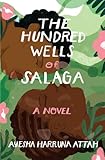 Here’s what Publishers Weekly had to say about The Hundred Wells of Salaga: “A Gonja king’s daughter and her slave pursue love, power, and freedom amid the dawning of colonialism in late-19th-century West Africa in Attah’s illuminating if overstuffed debut. Wurche, the daughter of Etuto, ruler of Salaga, accepts a political marriage to solidify Etuto’s power in advance of a war with two rival kingdoms. Etuto is victorious, but when he refuses Wurche’s advice about the encroaching Germans and British, she spitefully seeks out an affair with a reluctant slave trader named Moro. Meanwhile, Aminah, a commoner, is enslaved by raiders and sold to a sexually abusive farmer who in turn sells her to Wurche at a Salaga market. Attah’s attention to historical detail, extending from her characters’ diets to the wide diversity of cultures she captures, is impressive, though it’s too often swept aside by the torrent of events she describes. Wurche flees her suddenly abusive husband for Moro, but his growing attraction to Aminah complicates matters, as does Aminah’s desire to buy her freedom. Once Wurche learns that the Germans intend to capture Salaga and resolves to warn Etuto, the reader wonders if this fusion of romantic entanglement and geopolitics needs more pages than this slim volume has. Still, Attah’s exceptional research of the era shines through, making for a convincing historical novel.”
Here’s what Publishers Weekly had to say about The Hundred Wells of Salaga: “A Gonja king’s daughter and her slave pursue love, power, and freedom amid the dawning of colonialism in late-19th-century West Africa in Attah’s illuminating if overstuffed debut. Wurche, the daughter of Etuto, ruler of Salaga, accepts a political marriage to solidify Etuto’s power in advance of a war with two rival kingdoms. Etuto is victorious, but when he refuses Wurche’s advice about the encroaching Germans and British, she spitefully seeks out an affair with a reluctant slave trader named Moro. Meanwhile, Aminah, a commoner, is enslaved by raiders and sold to a sexually abusive farmer who in turn sells her to Wurche at a Salaga market. Attah’s attention to historical detail, extending from her characters’ diets to the wide diversity of cultures she captures, is impressive, though it’s too often swept aside by the torrent of events she describes. Wurche flees her suddenly abusive husband for Moro, but his growing attraction to Aminah complicates matters, as does Aminah’s desire to buy her freedom. Once Wurche learns that the Germans intend to capture Salaga and resolves to warn Etuto, the reader wonders if this fusion of romantic entanglement and geopolitics needs more pages than this slim volume has. Still, Attah’s exceptional research of the era shines through, making for a convincing historical novel.”
The Age of Light by Whitney Scharer
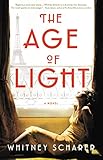 Here’s what Publishers Weekly had to say about The Age of Light: “Scharer’s stellar debut chronicles the tumultuous working and romantic relationships of photographer Man Ray and model-turned-photographer Lee Miller in early 1930s Paris. As as an older woman living on a farm in East Sussex, Lee contemplates an assignment to write about her time with Man. Scharer intersperses her memories of that era with the grim but satisfying later years of being a WWII photographer. The years during and after the fall of Hitler led to her most important work, but also to a drinking problem. These scenes are juxtaposed against her hope-and-love-filled initial years in Paris, where she meets the older Man at a party and later convinces him to take her on as an apprentice. Man nurtures her talent as a photographer but also proves himself possessive and controlling, both as a lover and as a mentor. It becomes clear that he and his circle of famous artists ultimately don’t take women’s work seriously, prompting Lee to betray him. When Man guts her by submitting her photography under his name for a prize, she exacts revenge via another project he wanted to take from her and brings matters to a head. Scharer’s brilliant portrayal of the complicated couple features a page-turning story and thrillingly depicts the artistic process.”
Here’s what Publishers Weekly had to say about The Age of Light: “Scharer’s stellar debut chronicles the tumultuous working and romantic relationships of photographer Man Ray and model-turned-photographer Lee Miller in early 1930s Paris. As as an older woman living on a farm in East Sussex, Lee contemplates an assignment to write about her time with Man. Scharer intersperses her memories of that era with the grim but satisfying later years of being a WWII photographer. The years during and after the fall of Hitler led to her most important work, but also to a drinking problem. These scenes are juxtaposed against her hope-and-love-filled initial years in Paris, where she meets the older Man at a party and later convinces him to take her on as an apprentice. Man nurtures her talent as a photographer but also proves himself possessive and controlling, both as a lover and as a mentor. It becomes clear that he and his circle of famous artists ultimately don’t take women’s work seriously, prompting Lee to betray him. When Man guts her by submitting her photography under his name for a prize, she exacts revenge via another project he wanted to take from her and brings matters to a head. Scharer’s brilliant portrayal of the complicated couple features a page-turning story and thrillingly depicts the artistic process.”
Hard to Love by Briallen Hopper
 Here’s what Publishers Weekly had to say about Hard to Love: “Hopper debuts with a smart group of essays on contemporary relationships. A literature scholar, Hopper cultivates a voice that is sophisticated and analytical, but also earnest and eager, and her strongest essays balance these qualities. In ‘Spinsters,’ her treatise on female friendship, she shares fond memories from her life, such as of falling asleep to a friend’s voice on the phone, while decrying how the ‘arbitrary conflation of marriage with the commitments and responsibilities of adult life sometimes turns unmarried people into second-class citizens, while devaluing many necessary kinds of love.’ Hopper also skillfully uses personal anecdote in a piece on how caring for a friend with cancer is both ‘the most adult thing… and the most adolescent thing,’ because it requires negotiating health insurance policies, but also ‘willful wish-fulfillment’ in the periods between treatments. Only rarely is she less successful, as in a disappointingly banal piece on ‘How to Be Single.’ Much more often, she demonstrates how being deeply personal with the people in one’s life can help one to be critically engaged. ‘I think about writing and hoarding together,’ she says, after describing the hoarders in her family, in that ‘so much has to be serendipitously discovered and rediscovered and collected and stored.’ There is some to be passed over in these essays, but there is much more to be discovered.”
Here’s what Publishers Weekly had to say about Hard to Love: “Hopper debuts with a smart group of essays on contemporary relationships. A literature scholar, Hopper cultivates a voice that is sophisticated and analytical, but also earnest and eager, and her strongest essays balance these qualities. In ‘Spinsters,’ her treatise on female friendship, she shares fond memories from her life, such as of falling asleep to a friend’s voice on the phone, while decrying how the ‘arbitrary conflation of marriage with the commitments and responsibilities of adult life sometimes turns unmarried people into second-class citizens, while devaluing many necessary kinds of love.’ Hopper also skillfully uses personal anecdote in a piece on how caring for a friend with cancer is both ‘the most adult thing… and the most adolescent thing,’ because it requires negotiating health insurance policies, but also ‘willful wish-fulfillment’ in the periods between treatments. Only rarely is she less successful, as in a disappointingly banal piece on ‘How to Be Single.’ Much more often, she demonstrates how being deeply personal with the people in one’s life can help one to be critically engaged. ‘I think about writing and hoarding together,’ she says, after describing the hoarders in her family, in that ‘so much has to be serendipitously discovered and rediscovered and collected and stored.’ There is some to be passed over in these essays, but there is much more to be discovered.”
The Atlas of Red and Blues by Devi Laskar
 Here’s what Publishers Weekly had to say about The Atlas of Reds and Blues: “Laskar’s stunning debut skillfully tackles hefty topics such as bullying, racism, and terrorism in a mosaic, life-flashing-before-one’s-eyes narrative. Set in 2017 near Atlanta, the novel centers on Mother, an Indian-American woman in her 40s with three daughters and a husband who travels internationally more than he’s at home. One morning, after taking her children to school, Mother is gunned down in her driveway in an unexplained robbery; the narrative is told in discursive segments that jump around in time to present flashes of Mother’s life, all while she lies dying. These short pieces cover her job as a former crime reporter demoted to obituaries; her North Carolina childhood and girlish fascination with Barbie dolls and their tainted concept of beauty; being asked, beginning as a child, where she was from, though she was born in the U.S.; her family’s move to the Atlanta suburbs in an unwelcoming neighborhood where other kids torment her middle daughter and cops often question Mother about her husband’s job. Laskar touchingly shows how Mother just wants to have a normal life with her family and rise above prejudice. Elevated by its roaming structure, this is a striking depiction of a single life.”
Here’s what Publishers Weekly had to say about The Atlas of Reds and Blues: “Laskar’s stunning debut skillfully tackles hefty topics such as bullying, racism, and terrorism in a mosaic, life-flashing-before-one’s-eyes narrative. Set in 2017 near Atlanta, the novel centers on Mother, an Indian-American woman in her 40s with three daughters and a husband who travels internationally more than he’s at home. One morning, after taking her children to school, Mother is gunned down in her driveway in an unexplained robbery; the narrative is told in discursive segments that jump around in time to present flashes of Mother’s life, all while she lies dying. These short pieces cover her job as a former crime reporter demoted to obituaries; her North Carolina childhood and girlish fascination with Barbie dolls and their tainted concept of beauty; being asked, beginning as a child, where she was from, though she was born in the U.S.; her family’s move to the Atlanta suburbs in an unwelcoming neighborhood where other kids torment her middle daughter and cops often question Mother about her husband’s job. Laskar touchingly shows how Mother just wants to have a normal life with her family and rise above prejudice. Elevated by its roaming structure, this is a striking depiction of a single life.”
Sea Monsters by Chloe Aridjis
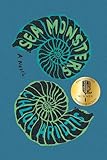 Here’s what Publishers Weekly had to say about Sea Monsters: “In Aridjis’s ethereal and ruminative second novel (after Book of Clouds), a new wave–loving teenage girl named Luisa, living in Mexico City, impulsively runs away from home with Tomás Román, an exotic and exciting boy she hardly knows. They head for Zipolite, the ‘Beach of the Dead’ in Oaxaca, where Luisa hopes to find a missing troupe of Ukranian dwarves that she believes may be hiding in the area after escaping from a Soviet circus touring Mexico. Enmeshed in precocious Luisa’s inner world, readers follow surreal fantasies and fascinations as she learns to dwell among Zipolite’s population of nudists, beachcombers, hippies, and even a so-called merman while she searches for the dwarves. She also meditates on William Burroughs, Baudelaire, Laurteamont, historical curiosities such as the shipwreck where researchers discovered the mysterious Antikythera Mechanism, and, above all, her favorite bands, including Joy Division and The Cure. The book functions more like a mood piece than a traditional novel, a fitting choice in rendering Luisa and Tomás’s life as runaways. Brilliant in her ability to get inside the head of her young narrator, Aridjis skillfully renders a slightly zonked-out atmosphere of mystery and the mind of a young romantic, resulting in a strange and hypnotic novel.”
Here’s what Publishers Weekly had to say about Sea Monsters: “In Aridjis’s ethereal and ruminative second novel (after Book of Clouds), a new wave–loving teenage girl named Luisa, living in Mexico City, impulsively runs away from home with Tomás Román, an exotic and exciting boy she hardly knows. They head for Zipolite, the ‘Beach of the Dead’ in Oaxaca, where Luisa hopes to find a missing troupe of Ukranian dwarves that she believes may be hiding in the area after escaping from a Soviet circus touring Mexico. Enmeshed in precocious Luisa’s inner world, readers follow surreal fantasies and fascinations as she learns to dwell among Zipolite’s population of nudists, beachcombers, hippies, and even a so-called merman while she searches for the dwarves. She also meditates on William Burroughs, Baudelaire, Laurteamont, historical curiosities such as the shipwreck where researchers discovered the mysterious Antikythera Mechanism, and, above all, her favorite bands, including Joy Division and The Cure. The book functions more like a mood piece than a traditional novel, a fitting choice in rendering Luisa and Tomás’s life as runaways. Brilliant in her ability to get inside the head of her young narrator, Aridjis skillfully renders a slightly zonked-out atmosphere of mystery and the mind of a young romantic, resulting in a strange and hypnotic novel.”
Friend of My Youth by Amit Chaudhuri
 Here’s what Publishers Weekly had to say about Friend of My Youth: “This striking novel from Chaudhuri (A Strange and Sublime Address) tracks a writer by the same name returning to his boyhood home of Bombay for a book reading. This time, the place feels different—it’s after the 2008 terror attack, and his childhood friend Ramu is back in rehab. Amit doesn’t have anywhere to be aside from his reading and running an errand for his family. As he wanders the streets, Amit reflects on why he left Bombay. He scans bookshelves for his work and doesn’t see his titles, forcing him to reconsider his mark on the city. He also thinks about the sacrifices his parents made for his education; his mother had to sell her jewelry after the family fell on hard times. Amit speaks with a working man who recalls his parents from years ago, making him realize though Amit’s parents no longer live in Bombay, they still belong. Without the anchor of seeing Ramu, Amit discovers how tenuous his connection to the past becomes. In this cogent and introspective novel, Chaudhuri movingly portrays how other people can allow individuals to connect their present and past.”
Here’s what Publishers Weekly had to say about Friend of My Youth: “This striking novel from Chaudhuri (A Strange and Sublime Address) tracks a writer by the same name returning to his boyhood home of Bombay for a book reading. This time, the place feels different—it’s after the 2008 terror attack, and his childhood friend Ramu is back in rehab. Amit doesn’t have anywhere to be aside from his reading and running an errand for his family. As he wanders the streets, Amit reflects on why he left Bombay. He scans bookshelves for his work and doesn’t see his titles, forcing him to reconsider his mark on the city. He also thinks about the sacrifices his parents made for his education; his mother had to sell her jewelry after the family fell on hard times. Amit speaks with a working man who recalls his parents from years ago, making him realize though Amit’s parents no longer live in Bombay, they still belong. Without the anchor of seeing Ramu, Amit discovers how tenuous his connection to the past becomes. In this cogent and introspective novel, Chaudhuri movingly portrays how other people can allow individuals to connect their present and past.”
A People’s Future of the United States edited by Victor LaValle and John Joseph Adams
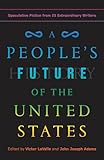 Here’s what Publishers Weekly had to say about A People’s Future of the United States: “LaValle (The Changeling) and Adams (The Living Dead) present an outstanding collection written by 25 heavy hitters of speculative fiction, offering dazzling and often chilling glimpses of an uncertain future in which America teeters on the brink. In ‘Calendar Girls’ by Justina Ireland, a young black girl arrested for selling illegal contraceptives must provide abortion transport to the daughter of the senator who criminalized contraception. In ‘Our Aim Is Not to Die’ by A. Merc Rustad, an autistic, nonbinary person struggles to survive an oppressive, technofascist society where each quality that marks them as atypical puts them at risk for being ‘remade’ into the ‘white, male, straight’ ideal. In ‘Riverbed’ by Omar El Akkad, a survivor of American Muslim internment returns to the site of her imprisonment to retrieve her slain brother’s possessions and confront America’s Islamophobic ghosts. Each story builds a plausible extrapolation of the current world, and each character is well drawn. This bold collection is full of hope, strength, and courage, and will be welcomed by readers looking for emotional sustenance and validation of their experiences in a challenging time.”
Here’s what Publishers Weekly had to say about A People’s Future of the United States: “LaValle (The Changeling) and Adams (The Living Dead) present an outstanding collection written by 25 heavy hitters of speculative fiction, offering dazzling and often chilling glimpses of an uncertain future in which America teeters on the brink. In ‘Calendar Girls’ by Justina Ireland, a young black girl arrested for selling illegal contraceptives must provide abortion transport to the daughter of the senator who criminalized contraception. In ‘Our Aim Is Not to Die’ by A. Merc Rustad, an autistic, nonbinary person struggles to survive an oppressive, technofascist society where each quality that marks them as atypical puts them at risk for being ‘remade’ into the ‘white, male, straight’ ideal. In ‘Riverbed’ by Omar El Akkad, a survivor of American Muslim internment returns to the site of her imprisonment to retrieve her slain brother’s possessions and confront America’s Islamophobic ghosts. Each story builds a plausible extrapolation of the current world, and each character is well drawn. This bold collection is full of hope, strength, and courage, and will be welcomed by readers looking for emotional sustenance and validation of their experiences in a challenging time.”
Also on shelves: Tonic and Balm by Stephanie Allen and Notes From a Black Woman’s Diary by Kathleen Collins.











